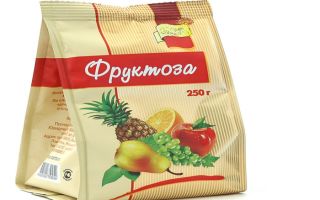Content
- 1 What is fructose and how is it obtained
- 2 Composition, nutritional value and calorie content of fructose
- 3 Why is fructose useful?
- 4 Is fructose good for pregnant and lactating women
- 5 Is it possible to give fructose to children
- 6 Fructose in diabetes mellitus
- 7 Is fructose possible for weight loss
- 8 Where is fructose found
- 9 The use of fructose
- 10 Daily intake of fructose
- 11 Harm of fructose and contraindications
- 12 What is the difference between fructose and glucose
- 13 Which is better: fructose or sugar
- 14 Conclusion
- 15 Reviews
The variety of modern food products has led to an increased tendency to monitor food quality and replace certain foods with others using health information. Sugar as the main source of the usual carbohydrates began to be replaced by substitutes. The benefits and harms of fructose as one of the substitutes are still under close scrutiny of researchers.
What is fructose and how is it obtained
Few people know that fructose is part of the dietary sugar. The word promotes the association with fruits that are extremely beneficial to health. In fact, a monosaccharide can be both beneficial for the body and be harmful.

Sucrose is composed of equal parts of known monosaccharides. The beneficial physical properties of fructose exceed those of glucose for the same parameters. It is found in fruits, vegetables and all types of honey. It is quickly absorbed and becomes a complete replacement for food refined sugar. Its chemical name is levulose. Chemical formula
Monosaccharide can be obtained using:
- extraction from Jerusalem artichoke tubers;
- hydrolysis using sucrose.
The latter method is used in industrial production. Its volumes have grown significantly in recent decades. This is due to the increased demand for the product.
Basic physical properties of fructose:
- crystalline form;
- white;
- well soluble in water;
- has no smell;
- several times sweeter than glucose.
Composition, nutritional value and calorie content of fructose
As a substitute, in terms of calories, taking this substitute almost does not justify itself. The nutritional value of levulose is 374 kcal. The difference is that in terms of taste, the fruit version is much sweeter than edible sugar, so the amount for sweetening the same dishes can be minimized.
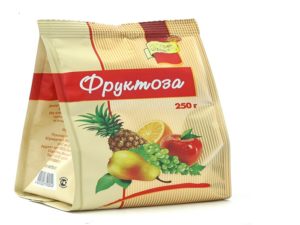
Fructose is a complete monosaccharide. This means that the carbohydrate consists of one element, is not divided into components, is absorbed in its original form.
Why is fructose useful?
The benefits and harms of fruit levulose are concepts that are completely interconnected. She is a participant in the chemical reactions of the body, which occur on the basis of beneficial or harmful properties.
- Promotes the flow of energy, tones.
- Has the ability to stimulate metabolic processes.
- Helps cleanse toxins.
- It has a distinctive property: not to promote the development of bacteria on the teeth and not to cause the development of caries.
- When consumed, it does not increase blood counts.
Is fructose good for pregnant and lactating women
Representatives of different theories argue about the benefits and dangers of fructose for the body during pregnancy. During the period of gestation, it is recommended to reduce the intake of sweets. They say about replacement if the expectant mother has the following conditions:
- having diabetes before pregnancy;
- increased blood counts;
- one of the stages of obesity.
For a nursing mother, the benefits of fructose as a sugar substitute may be less than harm if she consumes more than 40 grams per day.
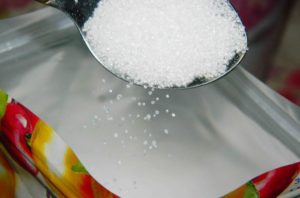
Is it possible to give fructose to children
For children under one year old, levulose is contraindicated. They should receive the necessary carbohydrates during this period from lactose.
After the introduction of fruits and vegetables into the baby's diet, the fruit sugar comes in its natural form. The benefits of obtaining this element from fruits are much higher than the same intake of sugar. If the body successfully copes with the absorption of carbohydrates, then there is no harm to the child, which often manifests itself as an allergic reaction.
Substituting fructose for children will only be beneficial if there are health hazards associated with the onset of symptoms of diabetic conditions.
Fructose in diabetes mellitus
The benefits of fructose for diabetics are undeniable. It has properties that are important in relieving the signs of both types of diabetes. Its main beneficial quality lies in the fact that it is absorbed without affecting the processes of insulin production.
Fructose has a low glycemic index, it is recommended as the main substitute for food refined sugar for diabetics. This does not mean that levulose can be consumed uncontrollably.
Is fructose possible for weight loss
The benefits of fructose for weight loss are undeniable, but only if it is obtained from healthy fruits and vegetables. Balance is achieved through high fiber content.
Fruit sugar can cause harm when losing weight and gaining extra pounds. Once in the body, it can only be processed by liver cells. With an overabundance and impossibility of further assimilation, it will settle in the form of fat.
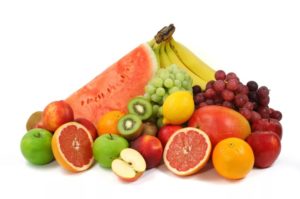
Where is fructose found
The main source of the substance is fruits, some vegetables, honey, berries.
|
source, 100 g |
volume of fructose contained |
|
blackberry |
3 g |
|
honey, herb variety |
39 g |
|
sweet and sour apple |
6 g |
|
black grapes |
7 g |
|
a tomato |
1 g |
The use of fructose
Sugar substitute is used in medicine and food industry:
- as a sugar substitute for diabetics;
- as one of the useful preservatives in the preparation of shelf-stable sweets;
- as an emergency aid for alcohol poisoning in the form of droppers;
- as a means of increasing endurance during physical activity in athletes.
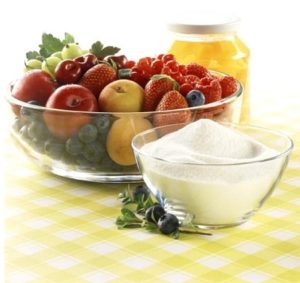
Daily intake of fructose
In order not to harm the body, but to benefit from replacing edible sugar, the maximum allowable limit for the use of a substitute is calculated. For an adult, it is 35 - 45 g.
Harm of fructose and contraindications
The beneficial levulose, which is found in fruits and vegetables, has almost no contraindications. A substitute in tablet form can cause significant harm if overused or taken incorrectly.
- Disorders in the endocrine system. What is a major benefit can be a significant disadvantage if taken too much.
- Changes within the body, the formation of fat around the liver or heart in excess.
- Disturbances in the activity of the liver due to the fact that it is the main processing organ.
The sugar found in fruits will not benefit people who are deficient in a digestive enzyme that helps them absorb this type of carbohydrate.
It is not recommended for people with liver disease in order to avoid stress on the organ.
Levulose tends to cause overeating. The usual volume of sucrose instantly saturates the body, and levulose, due to its slow absorption, helps to increase the dosage to satisfy the need for saturation.
What is the difference between fructose and glucose
The content of both monosaccharides in equal parts in one carbohydrate makes you think about their similarities and differences.
|
index |
fructose |
glucose |
|
processing method |
liver cells |
universal for all types of cells |
|
influence on saturation |
no instant saturation |
prevents the development of hunger |
|
influence on the production of hormones |
does not need insulin |
helps to increase insulin levels |
|
effect on blood counts |
does not affect |
helps to increase performance |
Recently, the theory has spread that glucose is the main energy base for the reproduction of cancer cells already present in the body. This is due to the effect of glucose on blood counts, their abrupt changes that are possible upon intake.
According to the researchers, fructose in prostate cancer should be the primary source of slow energy that is beneficial when consumed. In case of cancer, it is especially dangerous to use foods with a high glycemic index. Restricting carbohydrates is by no means the only useful technique in the fight against the development of cancer cells, but it is one of the main ones.
Which is better: fructose or sugar
The benefits and harms of fructose and sugar for a healthy person exist simultaneously. This is due to the fact that they belong to the same functional group - carbohydrates.
Levulose can be useful with its slow distribution in the body, but it can be difficult for a person unaccustomed to such actions to refrain from excessive intake.
The element that is contained in fruits cannot be harmful and is considered more useful than food refined sugar. Fruit intake cannot be overdose. In addition, they contain useful trace elements, vitamins and fiber.
Conclusion
The benefits and harms of fructose are similar concepts. With excessive use, it loses its beneficial properties. At the same time, the dosage is useful for people with certain health problems. The benefits and harms of fruit sugar are directly related to the amount of substitute consumed.

